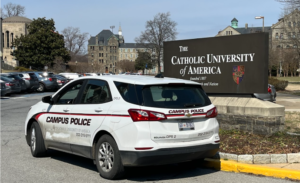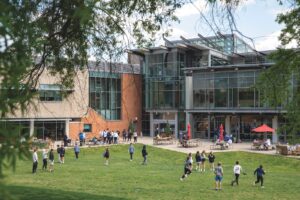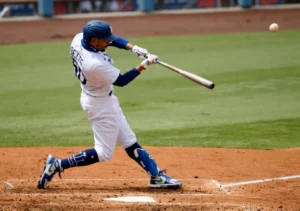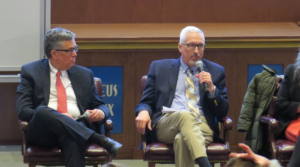The Aftermath of Hometown Violence: Catholic University’s Response to the Chaos at the Capitol
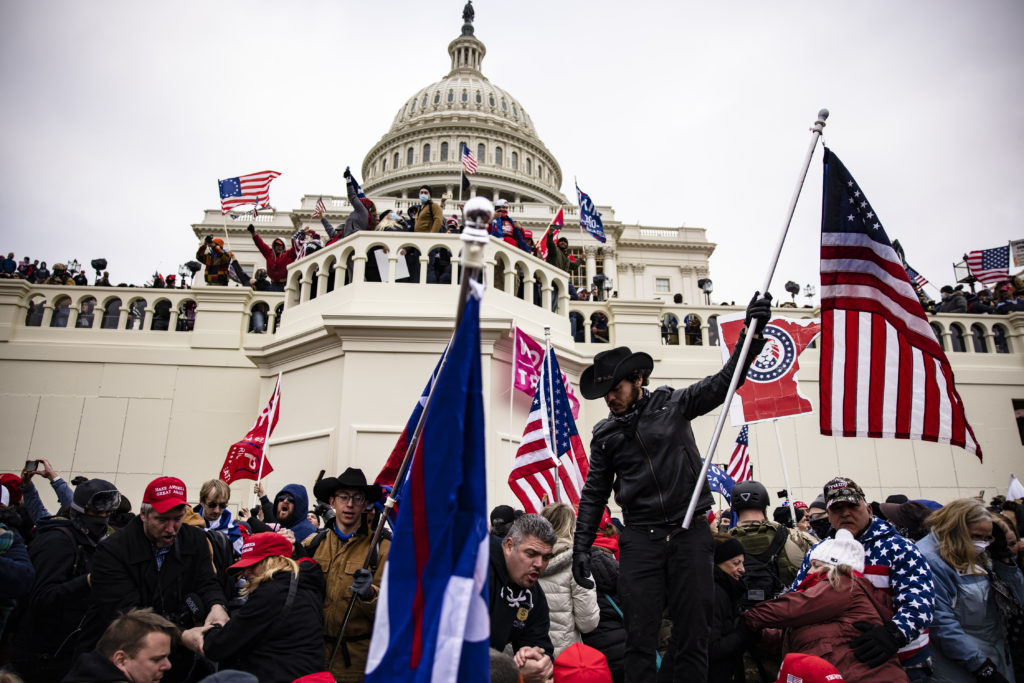
Image courtesy of Getty Images
By Shannon Rose Miekka
The pro-Trump riots that occurred during Congress’s election confirmation hearings on Wednesday, January 6 stunned the country and the world, but the rioting hits particularly close to home for members of the Catholic University community.
Washington, D.C. is a second home for students at Catholic University, located 3.4 miles from the Capitol. The violence that occurred Wednesday has resonated with Catholic University faculty, staff, students, and families.
As of January 9, five deaths have been linked to the riots, including one Capitol Police officer.
On Tuesday, Vice President for Public Safety and Emergency Management Major Kirk McLean sent a Public Safety Advisory to the Catholic University community.
“Regarding planned demonstrations for downtown Washington, D.C., [on Tuesday and Wednesday], information shared by our local and federal law enforcement partners indicate that there are no known safety concerns for the CatholicU community,” McLean said. “If any member of the Catholic University community chooses to exercise their right to peacefully demonstrate downtown, they are strongly urged to remain aware of their surroundings and to please stay clear of persons that look to incite or engage in confrontation.”
Responses within the Catholic University community
In an interview, Catholic University President John H. Garvey shared the same sentiment as many Americans, expressing that he has never seen anything like the recent events at the Capitol before.
“I’m ashamed of what’s happening at the Capitol,” Garvey said. “We have a law where people can demonstrate if they want … but this is just not what the Constitution had in mind.”
News coverage has used various terms to describe Wednesday’s events: protest, rally, riot, insurrection, and even coup.
“I’d call it a riot,” Garvey said. “People are entitled to protest, but this is a riot and you don’t expect in America to see people rioting at the Capitol building.”
Garvey added that citizens have a “moral as well as a civic responsibility” to respect the election process and its outcome.
“I would hope that [all eligible students] voted and made their voices heard,” Garvey said. “That’s how we choose the people who are going to govern us. It’s not the business of the Congress to do anything more than count the ballots, which is what they were doing [on Wednesday]. Congress doesn’t have authority to choose somebody other than the person the states elected and chose, and in this case that is President-elect Biden. So that’s over.”
Garvey believes that President Trump’s recurrent claims of a “stolen election” contributed to Wednesday’s events.
“It’s become a kind of obstinate refusal to accept the outcome of the election, which has encouraged people who have taken the further step of behaving badly in this way,” Garvey said. “I wish he was able to get past it as fast as the rest of the country has done.”
Catholic University Ordinary Professor of Politics Dr. John Kenneth White agreed that President Trump played a role in the riots.
“President Trump incited a riot that led to the mob violence on Capitol Hill,” White said. “Read his address to the crowd prior to the attack. Rudy Giuliani and Donald Trump, Jr. also incited the mob violence. Trump continues to incite people to act, saying he (and they) should fight on to invalidate a legitimate election (even as he now assures a peaceful transition). But it’s too easy to say this is on Trump alone. Our institutions need to reflect how they have created an environment where political disagreements become political wars.”
One example of incitement for mob violence cited by Dr. White occurred on Wednesday morning when former Mayor of New York City and personal attorney to the president Rudy Guiliani spoke at the “Save America” rally in front of the White House and called for a “trial by combat” just moments before the riots ensued.
“It will take the U.S. a long time to recover from [Wednesday’s] events,” White said. “The image we presented on the world stage was despicable. And the polarization which has divided the country into two different camps, much akin to the 1850s, helped create the situation that resulted in yesterday’s events. It’s hard to know what comes next (not just in the next two weeks but in the long term). Each of us is called upon to reflect.”
Several students and student organizations came forward to express their concerns.
“As a college student in Washington, D.C., I previously served as a legal intern for the US Department of Justice, in the Office of International Affairs,” senior Sean O’Grady wrote on Instagram. “No matter what your political affiliations are, or which party you belong to, please stand up against this tyrant. The acts [on Wednesday] are akin to the criminal dictatorships that I assisted in prosecutions against.”
The Student Government Association (SGA) published a statement on January 7.
“The Student Government Association joins the millions of concerned citizens on both sides of the aisle in forcefully condemning the outrageous events that took place in our nation’s capital yesterday,” the SGA statement stated. “We embrace the right to freedom of speech and the right to peaceably protest government. However, yesterday’s events were not peaceful. Our country witnessed a violent assault on the heart of our democratic republic.”
“In light of these events, the Student Government Association reaffirms its commitment to faith, unity, and peace,” the statement continued. “We encourage all members of the Catholic University community to recommit themselves to these principles in our service to the Church and the nation.”
According to a Tweet by Catholic University senior Michael Dreitlein, some attendants were spotted at the protest allegedly wearing Catholic University attire.
“There is absolutely nothing more disgusting than seeing people wearing Catholic University apparel storm the United States Capitol Building,” Dreitlein said. “It is absolutely deplorable, and they are not a member of our loving campus community. Disgusting criminals and traitors, not Cardinals.”
Dreitlein claimed that he and his brother, Catholic University senior Maxwell Dreitlein, saw two individuals on the steps of the Capitol wearing Catholic University hats and hoodies while watching news coverage of the event on CNN. Several replies to Dreitlein’s Tweet have asked for a response from the university and Garvey if these allegations are confirmed to be true.
Karna Lozoya, executive director of strategic communications for the Office of the President, replied to the Tweet, “Hello everyone. I have looked and couldn’t find anyone with Catholic U apparel. If you have screenshots, please pass them along. DMs open.”
No confirmation has been made as to whether or not any students or members of the university community participated in the violent protests.
While it is university policy that any member of the Catholic University community can peacefully demonstrate, the fate of someone caught participating in a violent manner is unclear.
When asked what would happen if students or faculty are found to have participated in a non-peaceful way, McLean answered, “All citizens are expected to abide by the laws within the jurisdiction that they happen to be in.”
Other student organizations have publicly condemned Wednesday’s events, including two of CUA’s most politically driven groups.
“The events of January 6 make clear what many have always understood, but were not permitted to say: we, as a nation, are sick & our condition is worsening,” said acting-President of CUA College Republicans Blayne Clegg. “When right-wing hounds can rip the U.S. Capitol apart, and far-left Marxists can burn parts of D.C. to the ground, like they did last May, we have a problem on our hands that is bigger than any one political party.”
CUA Republicans released a full statement on Instagram on January 6.
“What happened at the Capitol is a disgrace, an insurrection of violence, & an egregious display of white supremacy that has been enabled by this President since he announced his candidacy,” said President of CUA College Democrats Regina Brennan. “However, it is not unusual to Trump or this time alone…. A democracy is only as strong as how hard we fight for it, and we cannot fight for a democracy where white supremacy, bigotry, & hatred are enabled and emboldened.”
White is heartened by the common ground of Catholic University’s two leading political organizations.
“I have been encouraged over the years to see the bipartisanship that exists between the CUA College Democrats and CUA College Republicans,” White said. “These organizations have co-sponsored several events over the years. Members have also forged bipartisan friendships–some have roomed together, others have become best friends. This is encouraging and an example for all.”
Does this impact students’ safe return to campus?
Garvey and McLean expressed confidence in the safety and security at CUA.
“The students are certainly safe on campus and safe in the city,” Garvey said. “This far north on Capitol Street, what’s going on downtown, although it’s made a lot of noise and is a disgrace, it does not involve huge numbers of people. This part of the city is untouched by what’s going on.”
“The Department of Public Safety takes pride in keeping our community safe,” McLean echoed. “Although the demonstrations are occurring in the downtown region of the District of Columbia, our officers are very visible while maintaining a safe and secure campus for the students, faculty, staff, and visitors that are on campus.”
The inauguration of President-elect Joe Biden is on January 20, just five days before classes begin at CUA. The question on everyone’s mind after Wednesday: will this insurrection happen again on Inauguration Day?
The Tower asked both Garvey and McLean whether Wednesday’s events and the upcoming inauguration will impact students’ safety as they return to campus.
“The safety of our students, whether on or off campus, is of the upmost [sic] importance,” McLean said. “Members of the DPS maintain a clear and healthy line of communication with safety institutions across the National Capital Region.”
“We all frequently discuss current and prospective situational awareness matters,” McLean continued. “I feel very confident in saying that proactive safety measures are always being assessed, and not just during noteworthy occasions.”
Garvey expressed that he was initially disappointed that, due to the pandemic, the semester will begin after Inauguration Day.
“Every student here has the opportunity for one inauguration in his or her time as an undergraduate, so that was a shame,” Garvey said. “If they come back before, gosh I hope they have the opportunity to attend. I certainly hope we don’t have this kind of nonsense to deal with.”
When asked about additional safety precautions in the upcoming weeks, Garvey answered, “On this campus, I don’t anticipate any concerns. We’re just far enough removed from the Capitol. If students, for those who are back, will be attending the inauguration and we want to make sure that they are safe. I have no hesitation in saying that they would be.”
“That’s when these cons who were at the Capitol [on Wednesday will be] spending a little time cooling off in jail while the inauguration is going on,” Garvey chuckled.
Advice
White provided some advice for the CUA community during this time: “As citizens, we all have a role to establish civility, to agree to disagree (without being disagreeable), and to treat one another with respect as fellow Americans.”
The Tower asked Garvey what role the university can play in shaping its students to be better members of their communities in the aftermath of Wednesday’s events.
“One of the things that I’ve been unhappy about in [recent years] is the loss of a sense of how special the American experiment is and how successful it’s been,” Garvey said. “To have a functioning democracy on the scale of our own, that manages to accomplish a peaceful transition of power from one administration to the next, over a period of a couple centuries… The system we have had is an example to the world.”
Garvey hopes that Catholic University students can learn from the experience on Wednesday.
“I think they’ll see it— well I hope they’ll see it— as a lesson in how not to behave,” Garvey said. “I hope they take away from this that, in a functioning democracy, in a country that we love, when the people speak about who they want their leaders to be, they accept those results and deal with them as best we can.”

